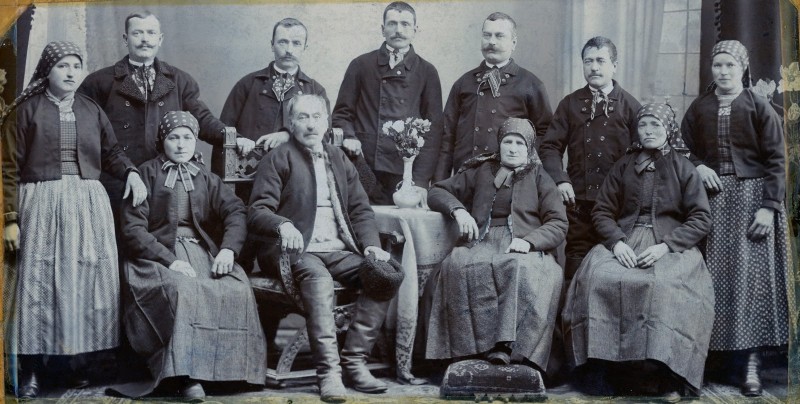No email. No texts. No chats. No tweets. No Facebook. By God! No telephone!
So how does twenty-one-year old Josef Gärtz, my grandfather, persuade the love of his life, Lisi, merely twenty-two, to make a 5,000 mile trek to join him in America? A letter took about two weeks to travel from Cleveland, Ohio, the first city my grandfather lived in after arriving in America, to Hermannstadt/Sibiu, where Lisi worked in what is today Romania.
That left plenty of time between communications for doubts and fears to creep into the mind of a young woman, to question the wisdom of taking on such a fearsome journey—alone.
But we’ve already seen that Josef Gärtz was a single-minded man. When he wanted something badly (like getting to America), he let little stand in his way. (See previous posts: Terror Atop the Train, Threat to the Dream, and Atlantic Crossing in Winter.
We last heard from him commenting on his Atlantic vogage, departing from the port of Bremen, Germany, on December 31, 1910, to New York aboard the steamship, Kronprinz Wilhelm. He had written in his diary:
“We had very stormy weather so that not a single person remained healthy or found any joy or pleasure on the ship. The ship flew up, then down, and made us completely dizzy….To travel over the water in winter is gruesome.”
In his letter to Lisi, Josef clearly has decided it would be imprudent to use such frightening descriptives if he hopes to persuade her to join him. Instead, he sugar-coats his ocean experience in this letter he writes from Cleveland. It begins thus:
1911, 29. J
Dearest Heart,
The train trip went luckily and well. The trip over the ocean was very good and comfortable, but one day I felt seasick. I was picked up by people from home [Neppendorf]. Now I’m sitting in a cozy room and thinking good thoughts about my destiny and pray to God to show me how to choose.
Except for a postcard he mentions sending from New York (which I don’t have), I’ve surmised this letter is Josef’s first to Lisi after arriving in Cleveland because in it he summarizes his trip (strategically leaving out the “gruesome” descriptions of the sea voyage), and because she responds two weeks later, on February 12, 1911, referencing what he says here.

“Father and Mother and All Sister and Brother of Samuel Beer without him on Picture. From Neppendorf, Siebenbürgen”
The letter (as well as family lore and records) indicates he’s staying with Eva and Samuel Beer, a couple from his hometown of Neppendorf. Like many immigrants, my grandfather depended upon friends from “the old country” to ease his way into America. This photo, now saved for more than a century, attests to the Beer family’s importance to my grandparents (I’m labeling it as my grandmother did, with her sometimes fractured grammar and spelling).
Josef continues his letter, encouraging/expecting Lisi to join him and pledging his devotion by declaring he only intends to marry once—to her.
Praise God that he was always standing by me. Because of my longing for you, I got through all this. Now I want you to check into all the legalities and rules so that nothing will get in the way of our getting married quickly, because I’ll only take this step [of marriage] once.
I’ve mentioned before that Josef was impatient, and his words seem to assume that Lisi is supposed to drop everything and come immediately:
Please advise me when you are coming. I cannot pick you up [when you arrive] even though I would like to, but my boss won’t allow it at all. My boss concerns himself with money and could hire another at any time [to take my job], and you will be able to get here just as well [with other friends] as if I were there.
I’m trying to decide if it’s better to look for a job in order to save some money so I won’t be obligated to anyone else because this trip cost me, including the clothes, almost everything I had saved in the last six years.
Since he already has a job, (see below) I guess he’s thinking of looking for another one. And six years of savings for this trip? That means he had to start planning when he was as young as fifteen!
From New York I wrote you a post card and I am now waiting for your answer. A Neppendorf woman helped me find a private home and a good job that pays well—60 Gulden per month. [A Gulden was the German name for the coin of the Austro-Hungarian Empire, pictured here]. It’s as I had always imagined, but didn’t believe I could really get that much.
I don’t know exactly what a Gulden was worth (he probably explains his wages in Guldens because Lisi will have no comprehension of a dollar’s worth at this time), but many years later, my grandmother wrote that when Josef first came to America, he worked seven days a week from 5 a.m. to 7 p.m. for $7 per week, so about $30/month for 400 hours of work, or about 7.5 cents an hour! His letter shows he seems quite satisfied!
And now with the best greetings and kisses from my heart, I greet you and also your brother-in-law, sister and the dear little Mitzi. Please answer quickly. I’m turning my writing now over to my friend, Frau [Mrs.] Beer. Please forgive me if I’ve offended you.
With greetings,
Josef
Was Josef worried that he might have offended Lisi because he couldn’t pick her up when she arrived (assuming she would come right away)? Or maybe because he’s pressuring her to get whatever legalities in order so they can marry? It’s unclear, but after his sweet closing, he has Frau Beer write several paragraphs to Lisi, which he encloses in the same envelope.
Perhaps Josef hoped Frau Beer would communicate with Lisi, woman-to-woman, reassuring her that coming to America was the right choice and Josef was the man for her. When you read what Mrs. Beer wrote, you may wonder, as I do, if it was a wise decision.
In the next non-Travel Tuesday post, we’ll see how Mrs. Beer’s words might very well have derailed Josef’s plan to lure Lisi to America.

Ooo, can’t wait to see what she said.
Hi Kerry,
I think it’s called “not having a filter. Tune in. And I’m so glad to see you here!
This is so much fun! I look forward to Mrs. Beer’s words, as well.
I’m looking forward to Mrs. Beer’s words, too. Can’t wait.
Such an interesting true-life story. Do you also have Lisi’s letters to Josef? Whether or not, we know she came because you’ve written posts about her, right?
Also, I’ve subscribed to comments by email so if you or others respond, I’ll be able to read what you/they say.
Hello Greta, Kathy & Nancy! So great to have you here, and thanks for subscribing, Nancy. I do have my grandmother’s letters as well. Hard to believe she saved all for her entire life. Then my parents’ saved them (just stuck in the attic), and now, a century later, with the help of my German 90-year-old “Rosetta Stone,” Meta, we can decipher and translate their words. — like a time machine. I love your comments.
This is such a beautiful story. Josef was a class act. This is truly the stuff that books are made of and a unique idea for a blog. This post is a cliffhanger. I can’t wait to see what happens next.
I knew my grandpa loved my grandmother, but discovering these letters and to see such devotion at such a young age — well, it was cool for me. More goodies to come.